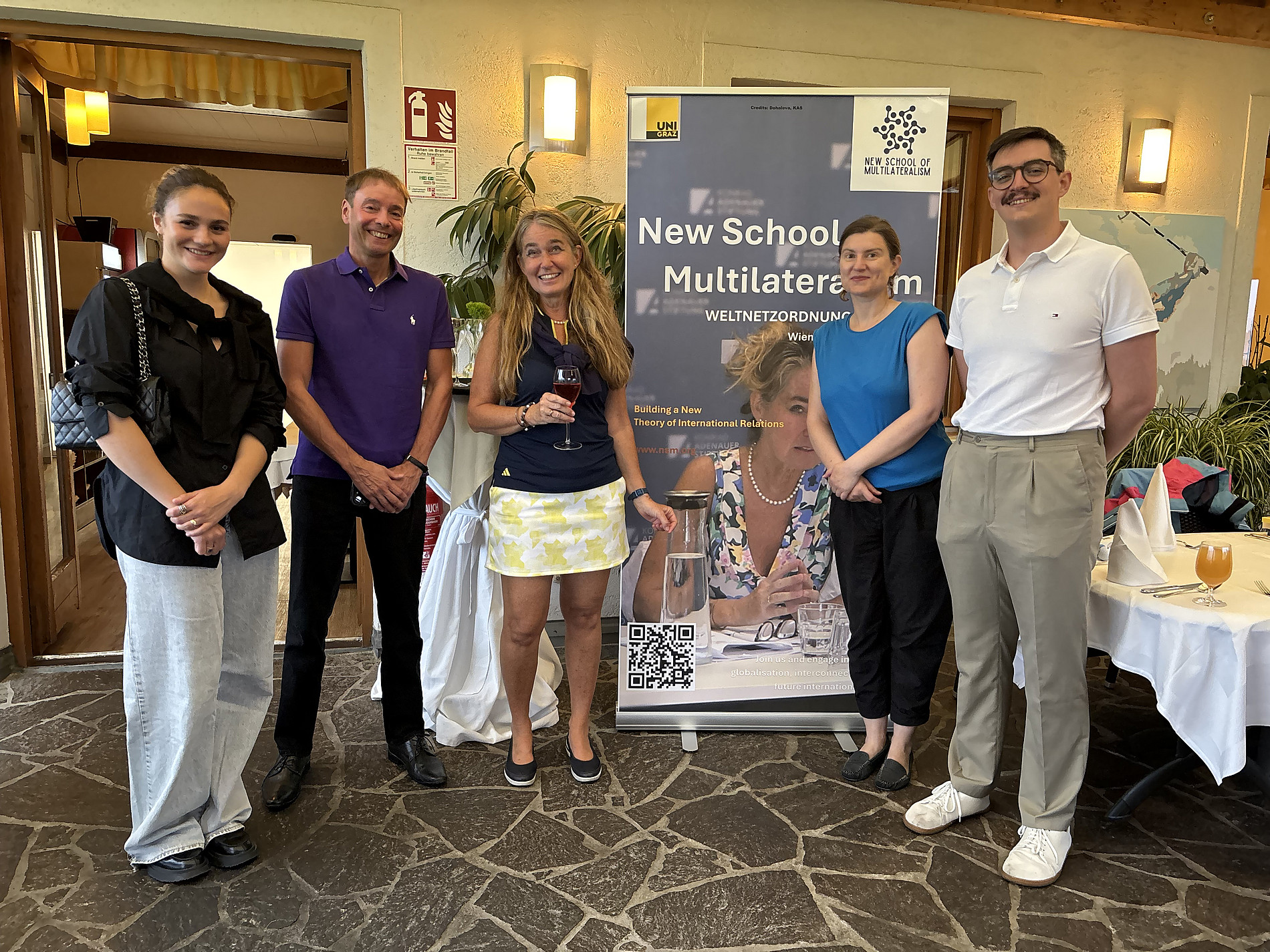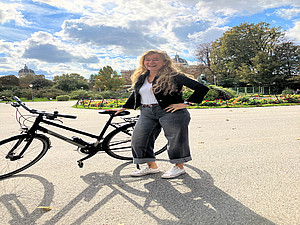NSM#BLOG PURPOSE AND OBJECTIVE
IDEAS WITHOUT BORDERS - SCIENCE BLOG FOR OPEN DEBATE IN GLOBAL AFFAIRS
We live in a multipolar, contested, and volatile international system. The level of disagreement on fundamental rights and future organisation of society is increasing globally. The blog will address topics around four areas of interest, democracy, governance, security, and rules-based international order.
HUMAN-CENTRED AGENDA SETTING - A PLATFORM FOR SCIENTISTS AND YOUNG ACADEMICS
We offer you an independent, interdisciplinary, evidence and science-based platform in German, French, Spanish and Anglophone spheres consisting in short scientific pieces addressing pressing geopolitical issues. Our focus lies in innovative, less heard creative voices identifying new ways of constructing international relations. We follow an explicit open access policy.
WHO WE ARE - OUR TEAM AS OF DECEMBER 2025
Founders: Ursula Werther-Pietsch and Friedarike Santner
Associates: Patrick C. R. Terry, Irene Giner-Reichl, Fred Tanner, Martin Kreutner, Reinhard Heinisch and Niklas Hintermayer
Young Editorial Group: David Bäckenberger, Philipp Röhr, Carla Fetcas, Sophie Gaugl, Anna Beer, Nicolai Wachmann, Stefanie Friedl, Matteo Morass and Lars Ullrich
Correspondents:
Western Balkans: Arber Ahmeti
Latin America: Nicolas Mayr
North America: Joel HöglNewsletter to follow in 2026!
NSM#BLOG CALL FOR CONTRIBUTIONS
RULES FOR CONTRIBUTING
Submissions will only be published if they: (a) are written in clear English, French, German or Spanish, to the point and well structured; (b) comply with our word limit of around 1000 to 1500 words; and (c) are respectful and of a fresh and innovative scientific style. Excellence and innovation are necessary conditions for publication, further we intend to balance areas of interest and special thematic pipelines. The content of the post remains with the author.
Submissions by PhD students are very welcome. Within the framework of the guiding rules for contributing, the content remains the responsibility of our authors. We normally take a few days to review submissions and give you feedback for revisions. Once this is done, the contribution can be published. To submit a post for consideration, please email to: ursula.werther-pietsch(at)univie.ac.at or friedarike.santner(at)gmail.com.
STYLE GUIDE FOR BLOG POSTS
1. Length and abstract: The general limit of about 1000 to 1500 words guarantees attention and readability in time. Please provide an abstract of up to 5 lines, which will be part of your post's teaser on SM.
2. Your bio and personal portrait photo. Please submit in the same word document as your post a CV in 2-3 lines, including if applicable a hyperlink to your university or professional webpage, and a portrait photo.
3. Fonts, spacing, and paragraph format: Upon request, a template can be sent to you by the editor. Otherwise, orient yourself simply on existing blog contributions. The final layout will be provided by the editors.
4. Citations: We do accept footnote citations but prefer references in parentheses immediately after the quotations they support. Please feel free to apply your style consistently throughout the document. Further reading can be added at the end of the article.
5. Hyperlinks and photos: Embedded hyperlinks are welcome if useful to the reader. We appreciate one photo per post, e.g. cover of your book or other content-related pictures.
The NSM#BLOG is happy to liaise with Vienna Diplomatic Academy, Austrian Institute for European and Security Policy, European Centre for Development Policy Maastricht (ecdpm), Empowering Democracy, Konrad Adenauer Stiftung Wien, Vienna Institute for International Dialogue and Cooperation (VIDC) and Militär Aktuell.
Lecture on Future International Relations
Hi, I delivered a presentation on my theory of international relations on 20 and 21 October 2024 at the European Academy of History and Culture in Dornbirn: Friedens- und Sicherheitsarchitektur. Wo stehen wir? Was ist zu erwarten? Vorschläge der New School of Multilateralism. The lecture is accessible on YouTube under WeltNetzOrdnung, Werther-Pietsch. If you want to learn more, please visit my YouTube channel Videos UWP on security policy, current shifts in geopolitics, the future of the multilateral system, as well as independent media and journalism.
NSM#BLOG NEWS CORNER
The United Nations Security Council is often criticized for being unrepresentative, paralysed by the veto and impotent in the face of major conflicts. Yet, beneath these familiar complaints lies a more profound dilemma: whether international society still believes in the desirability, let al.ne the possibility, of a global legal order anchored in the Security Council. This review essay situates contemporary reform debates against that larger question. It explores how proposals for modest procedural and working-method reforms collide with the political reality of entrenched permanent members; how expansion schemes risk draining attention from more feasible fixes; and how normative disagreements expose the fissure between Kelsenian faith in rules and Schmittian insistence on power. Alongside geopolitical tension, the Security Council must now contend with new existential threats – from climate change to artificial intelligence – that will test its mandate and legitimacy. The deeper problem, however, may not be the Security Council’s structure or procedures but, rather, the mismatch between the expectations placed upon it and what member states are prepared to deliver.
#freemedia4you is one of our frontline projects we are looking forward to present in Brussels, how to engage meaningfully and give sustained support to independent media outlets, to better integrate their valuable work into other sectors of concern such as security, trade, energy, climate change, migration, and, most importantly, to staff democracies with a sound information environment! More to come! See also newsletter of capacity4development here.
At the occasion of the 39th OECD GOVNET Plenary Meeting on 2 July 2025 in Paris, the NSM and the Austrian Ambassador to the Mission in Paris hosted a well-attended reception. The presentation of three volumes of the NSM Series and the "Democracy Declaration" to this eminent community of experts from all OECD member states, UN organisations, IFIs and leading think tanks was a highlight of the year!
Great panel discussion in Berlin with Berghof Foundation, Diplomats without Borders, CSSP - Berlin Center for Integrative Mediation, Bundesverband MEDIATION e.V., European Parliament in Germany, European Commission - Representation in Germany on peacebuilding and mediation. What is mediation, is peace mediation possible today, how can the EU respond to geopolitical challenges? A great deal of expertise on mediation and peacebuilding, EU Mediation Support, community of practitioners ‘around the table’.
While all panelists perceive the role of the UNO as universal and distinct, there is a risk of it becoming peripheral. This perspective is contested by the NSM theory of international checks and balances based on a triangle of peace consensus, democratisation / decentralisation, and a dual-layer peace mechanism ('regionalisation'), coupled with a demand for authentic leadership by multilateral decision-makers.
Conclusion: It is necessary to embrace more courage and risk in foreign policy, conduct political assessments, and lead decisively. Mistakes may occur, but inaction or idleness are not options. A call is made for establishing a Cabinet Focal Point within the HR VP for Mediation. Let us forge multilateralism!
Guy Patrick Banim, Martin Kobler, Sven Kühn von Burgsdorff, Theresa Lünemann, Christoph Lüttmann, Dr Carla Schraml, Elisabeth Pape - a great team and an honourable invitation to the European House Unter den Linden, less than 50m from the Brandenburg Gate and the German Bundestag!
The recent HLC gathered distinguished scholars and representatives of all European institutions, the European Commission, the European External Services, the European Defence Agency and many more as well as senior officials of the EU member states to discuss the future of European Security and Defence Policy (ESDC). And this in a critical time of the established settings, against the background of the newly designated European Commissioners to be heard by the European Parliament. A Special Edition of the Defence Horizon Journal presented the multi-facetted perspectives of these exciting discussions in Special Edition 3/2024.
In this section you will find the reports and some of the comments and assessments of the SotF 2024 as from 3 October 2024.
The Team Europe Democracy Initiative gathers experts of member states and civil society for sustained action in support of democratisation and human rights. The network is split in three interactive working groups, on inclusion, rule of law and media and digital governance. Austria is co-chairing the media group.
-> Discover more in the recently published newsletter.
On 9 September 2024, former ECB Governor Mario Draghi presented his report on the current and future competitiveness of the EU (which he consistently refers to as ‘Europe’, wasn't there something else? It weighs in at 400 pages, of which 69 are ‘competitiveness strategy’ and 328 are ‘detailed analyses and recommendations’). As you would expect from Draghi, the top civil servant, investment banker, central bank governor and ECB governor, it is an easy-to-read, well-argued report with a series of ‘radical’ proposals. ...
In response to the balkanisation of Africa due to colonisation, which resulted in fragmented micro-nations marked by economic fragility, the heads of state of 16 West African countries established the Economic Community of West African States (ECOWAS) in 1975. This community aimed to foster economic integration and solidarity, bridging the divide between English- and French-speaking countries. Following civil wars in Liberia and Sierra Leone, ECOWAS evolved into a peace and security organisation focused on democracy, good governance, and human rights, with a zero-tolerance policy for military coups. However, recent developments, including the fifth coup recorded in the region from 2020 onwards, and the subsequent formation of the Alliance of Sahel States (AES) by Mali, Niger and Burkina Faso, countered the effectiveness of ECOWAS in maintaining peace and democratic norms in the region, raising significant geopolitical consequences.
Democracy needs the free flow of information, and freedom of information needs democracy (#ijf24 Perugia) with Thomas Seifert, Chief editor of European Voices, Mira Milosevic from GFMD, and many others!
Uniting for Democracy - Supporting Free and Independent Media 2024 points to the fact that information governance is changing. What we need is responding to new scenarios and threats to media freedom. Why?
We live in a new era of geopolitical shifts, multipolarity and the competition of world orders. Polarisation is rising, open space closing, and what is more, human rights at large eroding. As a matter of fact the governance map is being rewritten. 72 percent of the world's population already live in autocratic systems, compared to 46 percent a decade ago. How to safeguard healthy information ecosystems as the very pillar of democratic space?
Would you like to share something? This is the best place for flashes and highlights by you, NSM Members and Affiliates! Please send an email with your content for this page to email: ursula.werther-pietsch@univie.ac.at.

